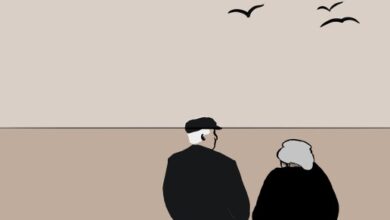Liars Don’t Qualify by Junius Edwards is a short story that delves into themes of racial discrimination, power dynamics, and the dehumanizing effects of prejudice. The story follows Will Harris, an African American man who arrives at an office to register for something. The story showcases the interactions and conversations that occur in this office, shedding light on the inherent racism and degradation faced by Will.
Liars Don’t Qualify | Summary
The story begins with Will Harris who is waiting to register to vote in the United States. He encounters a fat man at the office, who behaves rudely, and a bony man at the desk named Charlie who does not pay attention to Will. The fat man, Sam asks him a bunch of questions; he initially does not believe that he had come to register but then proceeds to ask him more questions. He asks if he has a job, to which Will says yes. He denies being affiliated with an organization. Sam goes on to ask Charlie about the 15th Amendment, and his documents. He also asks Will if he is “happy here”, to which Will replies affirmatively.
He is asked if he can read, if he is smart and finally Will says that he got out of the Army in New York. He names John Adams as one of the signers of the Declaration of Independence but is brusquely asked by Sam to reconsider his answer, to which he says ‘Mister John Adams’. He denies being a communist, having a car, or disliking his job. He also claims that he believes all men are created equal. The men try scaring him, but Will answers all questions honestly.
They ask him questions about the flag, the mayor of the town, the biggest hero in the war between the States, etc. Will answers them all. At the very end, he is denied from registering because he is a “liar”; he served in the Army Reserve for two years and thus belongs to an organization. He thus, doesn’t qualify to vote.
Liars Don’t Qualify | Analysis
The story is set in a time when racial segregation and discrimination were prevalent. The use of derogatory language by the fat man and the way Will is treated, based solely on his race, highlight the deeply ingrained racism in society. Will is referred to as “boy” and questioned repeatedly, emphasizing his lack of agency and respect due to his skin color. The fat man holds a position of authority in the office, while Will is in a subservient position as he waits to be called in. The power dynamics are evident in the way the fat man treats Will with condescension and dismissiveness, reinforcing the social hierarchy of the time.
Will’s experience of counting cigarette butts on the floor and witnessing the dirty waiting room highlights the dehumanizing conditions he’s subjected to. His observation of the cleanliness disparity between the waiting room and the office further underscores his disregard for his humanity. The bureaucracy of the office and the bony man’s indifference to Will’s purpose for being there highlight the systemic nature of racism. The exchange between the fat man and Charlie, with their mocking tone, reflects how racism is embedded even in institutional settings. The dialogue between characters reveals a lack of honest communication. The repetition of questions about why Will is there serves as a subtle way of undermining his intentions and intelligence.
Liars Don’t Qualify | Theme
The story highlights the pervasive racial discrimination and prejudice faced by African Americans during the time period. The derogatory language, condescension, and dismissive attitude directed towards Will reflect the systemic racism ingrained in society.
The story depicts how racial prejudice leads to the dehumanization of individuals. Will’s experience of being treated as “boy” and his observation of the dirty waiting room contrasted with the clean office emphasize his marginalization and lack of humanity.
The power dynamics between characters underscore the theme of power and control. The fat man’s position of authority and his demeaning behavior towards Will highlight how power is used to reinforce racial hierarchies. The story portrays how racism is not limited to individual attitudes but is also present within institutions. The office setting reflects the broader issue of institutional racism, as seen in the indifferent attitude of the bony man and the communication breakdown between the characters. The story unveils the social injustice faced by African Americans in a racially segregated society. Will’s ordeal serves as a microcosm of the broader social inequities present during that time.
Will’s experience of waiting for hours and being subjected to demeaning treatment highlights his marginalization and disempowerment. The story showcases how racism strips individuals of their agency and voice. While not overt, the story hints at the theme of resistance and defiance. Will’s decision to hold back his reactions and not confront the fat man can be seen as a form of quiet resistance in the face of racial prejudice.
Liars Don’t Qualify | Character Sketch
Will Harris
Will Harris is the protagonist of the story, an African American man who arrives at the office to register for something. He is patient, determined, and quietly resilient. Despite the racial discrimination and dehumanizing treatment he faces, Will maintains his composure and doesn’t allow himself to react emotionally. He is portrayed as a symbol of the broader struggles faced by African Americans during that time, representing their quest for dignity and equality.
Sam
“The fat man” is a figure of authority in the office. He holds a position of power, which he uses to assert his dominance over Will. He addresses Will condescendingly and derogatorily, exemplifying the deeply ingrained racial prejudice of the time. The fat man’s behavior reflects the systemic racism and lack of empathy present in the society.
Charlie
Charlie is a bony man who works in the office alongside the fat man. He is dismissive and indifferent to Will’s purpose for being there. He engages in sarcastic banter with the fat man, revealing their shared bias and insensitivity. Charlie’s lack of empathy and active participation in demeaning Will highlight the complicity that can exist within the system.
“Liars Don’t Qualify” effectively portrays the subtle and overt ways that racism permeates interactions and institutions. The characters highlight the dynamics of power, prejudice, and resilience present in the story. Will’s determination to maintain his dignity despite the challenges he faces stands in contrast to the discriminatory attitudes of Sam and Charlie. The characters serve as vessels through which the story explores themes of racial discrimination, dehumanization, and the complexities of interpersonal interactions in a racially segregated society. The story sheds light on the degrading treatment faced by African-Americans during that period and provides readers with a window into the complexities of the racial divide in society.


